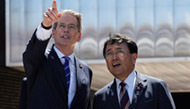So what do contributions in the last election cycle say? The Democrats are, not too surprisingly, the party of Big Labor (or what’s left of it) and Big Law: unions and lawyers are the most pro-Democratic major interest groups. Republicans are the party of Big Energy and Big Food: they dominate contributions from extractive industries and agribusiness. And they are, in particular, the party of Big Pizza.
No, really. A recent Bloomberg report noted that major pizza companies have become intensely, aggressively partisan. Pizza Hut gives a remarkable 99 percent of its money to Republicans. Other industry players serve Democrats a somewhat larger slice of the pie (sorry, couldn’t help myself), but, over all, the politics of pizza these days resemble those of, say, coal or tobacco. And pizza partisanship tells you a lot about what is happening to American politics as a whole.
Why should pizza, of all things, be a divisive issue? The immediate answer is that it has been caught up in the nutrition wars. America’s body politic has gotten a lot heavier over the past half-century, and, while there is dispute about the causes, an unhealthy diet . fast food in particular . is surely a prime suspect. As Bloomberg notes, some parts of the food industry have responded to pressure from government agencies and food activists by trying to offer healthier options, but the pizza sector has chosen instead to take a stand for the right to add extra cheese.
The rhetoric of this fight is familiar. The pizza lobby portrays itself as the defender of personal choice and personal responsibility. It’s up to the consumer, so the argument goes, to decide what he or she wants to eat, and we don’t need a nanny state telling us what to do.
It’s an argument many people find persuasive, but it doesn’t hold up too well once you look at what’s actually at stake in the pizza disputes. Nobody is proposing a ban on pizza, or indeed any limitation on what informed adults should be allowed to eat. Instead, the fights involve things like labeling requirements . giving consumers the information to make informed choices . and the nutritional content of school lunches, that is, food decisions that aren’t made by responsible adults but are instead made on behalf of children.
Beyond that, anyone who has struggled with weight issues . which means, surely, the majority of American adults . knows that this is a domain where the easy rhetoric of “free to choose” rings hollow. Even if you know very well that you will soon regret that extra slice, it’s extremely hard to act on that knowledge. Nutrition, where increased choice can be a bad thing, because it all too often leads to bad choices despite the best of intentions, is one of those areas . like smoking . where there’s a lot to be said for a nanny state.
Oh, and diet isn’t purely a personal choice, either; obesity imposes large costs on the economy as a whole.
But you shouldn’t expect such arguments to gain much traction. For one thing, free-market fundamentalists don’t want to hear about qualifications to their doctrine. Also, with big corporations involved, the Upton Sinclair principle applies: It’s difficult to get a man to understand something when his salary depends on his not understanding it. And beyond all that, it turns out that nutritional partisanship taps into deeper cultural issues.
At one level, there is a clear correlation between lifestyles and partisan orientation: heavier states tend to vote Republican, and the G.O.P. lean is especially pronounced in what the Centers for Disease Control and Prevention call the “diabetes belt” of counties, mostly in the South, that suffer most from that particular health problem. Not coincidentally, officials from that region have led the pushback against efforts to make school lunches healthier.
At a still deeper level, health experts may say that we need to change how we eat, pointing to scientific evidence, but the Republican base doesn’t much like experts, science, or evidence. Debates about nutrition policy bring out a kind of venomous anger . much of it now directed at Michelle Obama, who has been championing school lunch reforms . that is all too familiar if you’ve been following the debate over climate change.
Pizza partisanship, then, sounds like a joke, but it isn’t. It is, instead, a case study in the toxic mix of big money, blind ideology, and popular prejudices that is making America ever less governable.
스마터리빙
more [ 건강]
[ 건강]이제 혈관 건강도 챙기자!
[현대해운]우리 눈에 보이지 않기 때문에 혈관 건강을 챙기는 것은 결코 쉽지 않은데요. 여러분은 혈관 건강을 유지하기 위해 어떤 노력을 하시나요?
 [ 건강]
[ 건강]내 몸이 건강해지는 과일궁합
 [ 라이프]
[ 라이프]벌레야 물럿거라! 천연 해충제 만들기
 [ 건강]
[ 건강]혈압 낮추는데 좋은 식품
[현대해운]혈관 건강은 주로 노화가 진행되면서 지켜야 할 문제라고 인식되어 왔습니다. 최근 생활 패턴과 식생활의 변화로 혈관의 노화 진행이 빨라지고
사람·사람들
more
[송년행사 화보] “이웃과 함께 나누고 지인과 함께하니 행복”
KYCC13일 윌튼 플레이스 초등학교에서 열린 ‘한인타운청소년회관(KYCC) 홀리데이 카니발’이 성황리에 막을 내렸다. 올해는 KYCC 창립 …

[송년행사 화보] “ ‘손에 손잡고’ 한 해 마무리… 건강과 행복 기원”
전주고·북중남가주 전주고·북중 총동창회(회장 백규종)의 2025년 정기총회 및 송년회가 지난 14일 LA 작가의 집에서 성황리에 열렸다. 이날…
[송년행사 화보] “한 해를 마무리하며… 화기애애…
LA 러너스클럽LA 러너스클럽(회장 김두병)은 13일 작가의 집에서 80여명의 회원과 가족이 참석한 가운데 송년회를 마쳤다. 2007년 창립된…
[송년행사 화보] “웃음과 감사 가득 ‘훈훈’… …
한국학교총연합회미주한국학교총연합회(회장 이영숙)가 주최한 제43회 장기 근속교사 포상 및 송년의 밤 행사가 140여명의 교사들이 참석한 가운데…
[송년행사 화보] “친구야 반갑다… 선배님들 모두…
경남중고경남중·고등학교 남가주 동창회(회장 예해덕)는 지난 6일 송년회를 열고 동문 및 가족 60여 명이 참석한 가운데 끈끈한 우정을 확인했다…
많이 본 기사
- 노스캐롤라이나주 공항서 商用항공기 추락…”복수의 사망자”
- 위기의 트럼프 “내년봄 최대규모 세금… 1
- 尹, 계엄군 장성들에 “미안”…계엄엔… 1
- 67명 숨진 워싱턴 여객기·軍헬기 충돌에 정부 ‘책임 인정’
- 독이 된 박나래 영상..문장 끝 꾹 닫힌 입까지 분석 “리스크 관리 최대”
- 美, ‘네타냐후 체포영장·조사’ 국제형사재판소 판사 제재
- 경찰, 통일교 자금줄 쥔 한학자 前비서실장 13시간 조사
- 韓국방부 “美와 핵잠수함 연료공급 협상 2년 내 완료 목표”
- 백악관, ‘인플레둔화’ 지표에 반색… “바이든 위기와 극명 대비”
- ‘무려 94.2%’ 안세영 새 역사 썼다, 역대 단일 시즌 ‘女 최고 승률’
- 에어 프레미아 취항, 기대 컸나
- ‘라도♥’ 에이핑크 윤보미, 손편지로 결혼 발표..9년 열애 결실 “함께하기로”
- “김혜성만큼은 받지 않을까” 송성문 포스팅 D-3, ML 스카우트도 낙관했다
- “왜 한국 자산 미국으로 옮겨야 하나… 1
- 어느덧 20주년.. ‘5남매 가족’ 이동국♥이수진, 세월 잊은 비주얼
- “금리 대폭인하 신봉자”…트럼프가 곧 낙점할 연준 차기의장 누구
- ‘이건희 컬렉션’ 첫 해외 전시에 1만5천명 다녀가… ‘뮷즈’ 완판
- 내년 봄 새 앨범→대규모 월드투어..방탄소년단, 완전체 컴백 앞두고 글로벌 음악시장 ‘놀라운 영향력’
- 브라운대 한인학생, 총격참사 극적 생존
- 하원, ‘트럼프 베네수엘라 군사작전 저지 결의’ 무산
- 변정수, 갑상선암→성대결절 고백 “거의 죽음을 경험했다”
- “보이스피싱 이렇게 당한다”
- 엡스타인 ‘공범’ 옛 연인 “공정한 재판 못받았다” 석방요구 청원
- LA 소파이 스테디엄 8경기 확정
- 올해 앵커 재산세 환급 163만명에 18억달러 지급
- 북가주 CBMC 송년 감사예배
- 워싱턴 일원 소비 확 줄어들었다
- 설날, 공립학교 휴일 되나?
- 미일, ‘日 5천500억 달러 대미… 1
- 구글-메타, 엔비디아 독주 막으려 ‘오월동주’…AI칩 SW개발 협력
- 중고차 주행거리 조작 ‘주의보’
- ‘브라운대 총기참사’ 뉴욕 한인학생도 총상
- 월드컵 방문객 ‘미국행’… 한국선 ESTA(전자 여행 허가서)로 입국 가능
- “판공비 1만달러 전액 반환하겠다” 3
- “지역 도장과 협동 강화하겠다”
- “북VA 주택시장 가격 급등 없다”
- LA산불 여파 ‘심각’ 지역 주민 건강악화
- 크리스마스 연휴 겨울폭풍 남가주 연안 2~4인치 비
- 도난 방지 보호장치 무상 제공
- 버지니아 주하원 11지구 민주당 경선
- 강경화 주미대사 신임장 제정 트럼프,… 1
- [윌셔에서] 잠시 멈추어 서서
- 치솟는 원·달러 환율… 1,480원대 찍어
- 비트코인, 역대 네번째 연간 하락세
- 소피아 김의 ‘독보적인 영어 대화법’
- [로터리] 지멘스가 만드는 미래 동네
- 미 북서부는 홍수, 동부는 폭설 사태 비상
- 뱅크오브호프, 규모도 1위·봉사활동도 ‘으뜸’
- 컨설팅 제왕 맥킨지 수천명 감원 칼바람
- [수잔 최 변호사의 LIFE &] AI 시대 편리함에 안주하지 말자
1/5지식톡

-
 ☝️해외에서도 가능한 한국어 선생님…
0
☝️해외에서도 가능한 한국어 선생님…
0이 영상 하나면 충분합니다!♥️상담신청문의♥️☝️ 문의 폭주로 '선착순 상담'만 진행합니다.☎️ : 02-6213-9094✨카카오톡ID : @GOODEDU77 (@골뱅이 꼭 붙여주셔야합니다…
-
 테슬라 자동차 시트커버 장착
0
테슬라 자동차 시트커버 장착
0테슬라 시트커버, 사놓고 아직 못 씌우셨죠?장착이 생각보다 쉽지 않습니다.20년 경력 전문가에게 맡기세요 — 깔끔하고 딱 맞게 장착해드립니다!장착비용:앞좌석: $40뒷좌석: $60앞·뒷좌석 …
-
 식당용 부탄가스
0
식당용 부탄가스
0식당용 부탄가스 홀세일 합니다 로스앤젤레스 다운타운 픽업 가능 안녕 하세요?강아지 & 고양이 모든 애완동물 / 반려동물 식품 & 모든 애완동물/반려동물 관련 제품들 전문적으로 홀세일/취급하는 회사 입니다 100% …
-
 ACSL 국제 컴퓨터 과학 대회, …
0
ACSL 국제 컴퓨터 과학 대회, …
0웹사이트 : www.eduspot.co.kr 카카오톡 상담하기 : https://pf.kakao.com/_BEQWxb블로그 : https://blog.naver.com/eduspotmain안녕하세요, 에듀스팟입니다…
-
 바디프렌드 안마의자 창고 리퍼브 세…
0
바디프렌드 안마의자 창고 리퍼브 세…
0거의 새제품급 리퍼브 안마의자 대방출 한다고 합니다!8월 23일(토)…24일(일) 단 이틀!특가 판매가Famille: $500 ~ $1,000Falcon: $1,500 ~ $2,500픽업 & 배송직접 픽업 가능LA…
케이타운 1번가
오피니언
 수잔 최 한미가정상담소 이사장 가정법 전문 변호사
수잔 최 한미가정상담소 이사장 가정법 전문 변호사 [수잔 최 변호사의 LIFE &] AI 시대 편리함에 안주하지 말자
 김도년 성균관대 건축학과 교수 스마트도시·건축학회장
김도년 성균관대 건축학과 교수 스마트도시·건축학회장 [로터리] 지멘스가 만드는 미래 동네

[여명] 금붕어를 키우는 오지선다형 수능
 허경옥 수필가
허경옥 수필가 [윌셔에서] 잠시 멈추어 서서
 양홍주 / 한국일보 논설위원
양홍주 / 한국일보 논설위원[지평선] 판다 없는 일본

[왈가 왈부] 쿠팡 김범석 “글로벌 CEO라 불출석”… ‘맹탕’ 청문회 불보듯
 정숙희 논설위원
정숙희 논설위원칠레에서 영국까지, 27년을 걷다
 마크 A. 시쎈 / 워싱턴포스트 칼럼니스트
마크 A. 시쎈 / 워싱턴포스트 칼럼니스트 [마크 A. 시쎈 칼럼] MAGA와 ‘힘에 바탕한 외교정책’
 김동찬 시민참여센터 대표
김동찬 시민참여센터 대표 [미국은 지금] 위기의 시대, 사회안전망은 최후의 방어선이다
1/3지사별 뉴스

‘브라운대 총기참사’ 뉴욕 한인학생도 총상
▶총상 입은 상황서도 동료학생 의식 잃지않도록 도와 ▶부친도 동문 “우리 가족에게 고통스러운 일”지난 13일 발생한 브라운대학교 총기난사(본보…
뉴욕주 안락사 합법화 초읽기 호쿨, “안전장치 마련되면 서명”

워싱턴 일원 소비 확 줄어들었다
올해 8월 워싱턴DC에 범죄와의 전쟁을 명분으로 주방위군이 본격적으로 배치된 가운데, 이 시기 이후부터 버지니아와 메릴랜드, DC 등 워싱턴 …
“북VA 주택시장 가격 급등 없다”

베이지역 스포츠팀, SF 한인회에 후원금
샌프란시스코 베이지역 한인회(회장 김한일)는 한인 메이저리거 이정후 선수의 소속팀인 샌프란시스코 자이언츠(San Francisco Giants…
불자커뮤니티 20일 청소년발표회및 송년회

오늘 하루 이 창 열지 않음 닫기 



















































.png)


댓글 안에 당신의 성숙함도 담아 주세요.
'오늘의 한마디'는 기사에 대하여 자신의 생각을 말하고 남의 생각을 들으며 서로 다양한 의견을 나누는 공간입니다. 그러나 간혹 불건전한 내용을 올리시는 분들이 계셔서 건전한 인터넷문화 정착을 위해 아래와 같은 운영원칙을 적용합니다.
자체 모니터링을 통해 아래에 해당하는 내용이 포함된 댓글이 발견되면 예고없이 삭제 조치를 하겠습니다.
불건전한 댓글을 올리거나, 이름에 비속어 및 상대방의 불쾌감을 주는 단어를 사용, 유명인 또는 특정 일반인을 사칭하는 경우 이용에 대한 차단 제재를 받을 수 있습니다. 차단될 경우, 일주일간 댓글을 달수 없게 됩니다.
명예훼손, 개인정보 유출, 욕설 등 법률에 위반되는 댓글은 관계 법령에 의거 민형사상 처벌을 받을 수 있으니 이용에 주의를 부탁드립니다.
Close
x